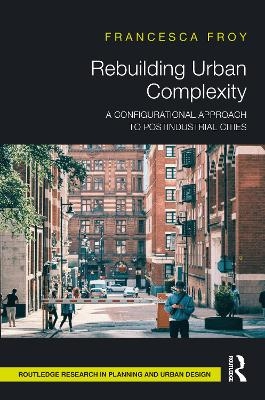
Rebuilding Urban Complexity
Routledge (Verlag)
978-1-032-38456-6 (ISBN)
- Noch nicht erschienen (ca. Dezember 2024)
- Versandkostenfrei innerhalb Deutschlands
- Auch auf Rechnung
- Verfügbarkeit in der Filiale vor Ort prüfen
- Artikel merken
This book explores the evolution and destruction of complexity in one city – Greater Manchester – but also other post-industrial cities, including Sheffield and Newcastle, Detroit and New Haven. The focus is on the networked qualities of public urban space, and how street networks work as multiscale systems. The book also explores economic networks, and the evolving sets of interconnecting economic capabilities which help to shape urban economies. It demonstrates how cities evolve through processes of self-organisation – and conclude by considering how policy makers can best harness such processes as they rebuild urban complexity following the insensitive planning interventions of the 1960s and 1970s.
The book will appeal to anybody with an interest in cities, and how they work. It is interdisciplinary in scope, weaving in strands from architecture, economics, history, anthropology and ecology. It is written for both academics but also non-academics, including urban planners, architects and policy makers.
Francesca Froy is a Lecturer on Sustainable Urban Development at the University of Oxford and is a Fellow of Kellogg College. She has honorary positions at the Bartlett Schools of Planning and Architecture where she previously researched and taught urban morphology and local economic development. She is also an Associate working on the spatial dimensions of sustainable economies at the consultancy firm Space Syntax. Francesca was a senior policy analyst at the Organisation for Economic Cooperation and Development (OECD) from 2005-15 where she coordinated international reviews of policies to support local economic development. Before that she evaluated urban and regional European policies based in Brussels. Her articles can be found in peer-reviewed academic journals including the Cambridge Journal of Regions, Economy and Society; Local Economy; the Oxford Review of Economic Policy, the European Planning Journal; the Journal of Urban Design; and Environment and Planning A: Economy and Space.
List of figures
List of boxes
Acknowledgements
Introduction
PART ONE
Chapter 1: Why focus on urban complexity?
Chapter 2: Theories of complexity
Chapter 3: Parts and wholes: the configuration of urban economies
Chapter 4: Parts and wholes: the configuration of urban space
Chapter 5: Bringing together configurational analysis of economies and space
PART TWO
Chapter 6: How local economies evolve and branch
Chapter 7: How spatial complexity evolves and supports branching economies
Chapter 8: Waterproofing – a case study
Chapter 9: The destruction of urban complexity
PART THREE
Chapter 10: Cities as systems of systems – where nature fits in
Chapter 11: Rebuilding urban complexity – how can policy makers intervene?
Index
| Erscheint lt. Verlag | 9.12.2024 |
|---|---|
| Reihe/Serie | Routledge Research in Planning and Urban Design |
| Zusatzinfo | 2 Line drawings, color; 19 Line drawings, black and white; 9 Halftones, black and white; 2 Illustrations, color; 28 Illustrations, black and white |
| Verlagsort | London |
| Sprache | englisch |
| Maße | 156 x 234 mm |
| Themenwelt | Naturwissenschaften ► Biologie ► Ökologie / Naturschutz |
| Naturwissenschaften ► Geowissenschaften ► Geografie / Kartografie | |
| Technik ► Architektur | |
| Technik ► Bauwesen | |
| Wirtschaft ► Volkswirtschaftslehre | |
| ISBN-10 | 1-032-38456-5 / 1032384565 |
| ISBN-13 | 978-1-032-38456-6 / 9781032384566 |
| Zustand | Neuware |
| Haben Sie eine Frage zum Produkt? |
aus dem Bereich


